How My Language Immersion Program Enhanced My Experience Studying Abroad
I studied abroad in the fall of 2025 in Aix-en-Provence, France, with my main goal to improve my French. By participating in IAU’s French Honors Program and choosing to live in a homestay, I hoped to make this happen. In this blog, I’d like to share a bit about my experience in a linguistic and cultural immersion program in France. The French Honors program required me to take four upper-level French classes; the areas I focused in were politics and culture, translation, art, and literature. Not only did it help me improve my French, but it taught me so much about the unique culture of the South of France. In its fullness, I feel that this program really aided my immersion in Aix.
A Rich Understanding of Provence
My classes focused heavily on Provençal authors and artists. We spent a lot of time analyzing passages about certain landscapes in Aix, including people’s homes, the countryside, the beloved Monte Sainte Victoire, and more. These passages provided rich descriptions that gave the reader the impression that they were seeing the landscape with their own eyes. By all Provençal authors, the region is characterized as charming and modest, full of happy people who appreciate a simple life.
In addition to enjoying Provençal literature, I found great pleasure in looking at landscapes created by local artists. I learned that the region of Provence is a popular subject of French Impressionist paintings due to its serene beaches, tranquil countryside, and constant sunlight. Aix is so proud of their homegrown Impressionist painter, Paul Cezanne. Cezanne and other Impressionist artists depict the South’s beauty with personal touches, such as their unique and explosive use of color and loose brush strokes, all to evoke each artist's deep appreciation for the landscape and for the South’s serenity.
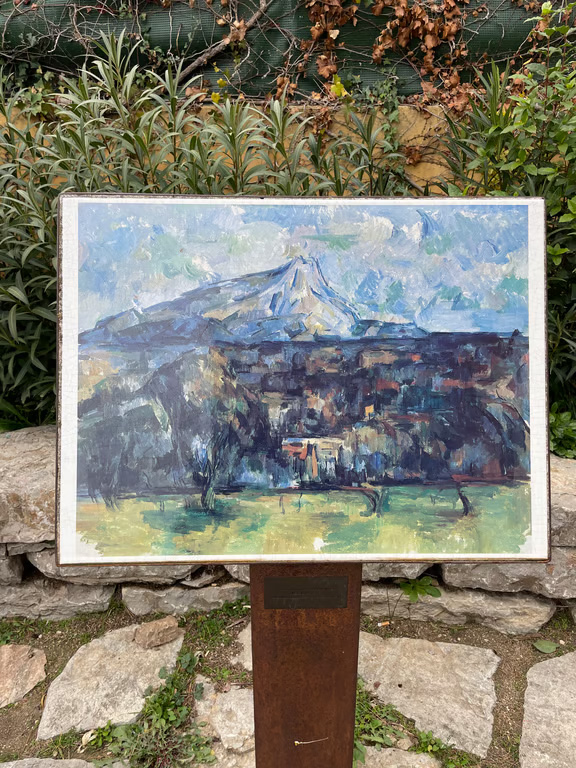
This is one of Cezanne’s many paintings of Monte Sainte-Victoire, located at the Field of the Painters.
My final project served as an homage to my souvenirs in Provence. We were instructed to create a small booklet in which we paired photos we took with short writings, with the requirement that our writing imitates the styles of Provençal authors we studied in class. This was a space where I could pay tribute to the small things that made my experience so great. To me, this is what Provence is all about.
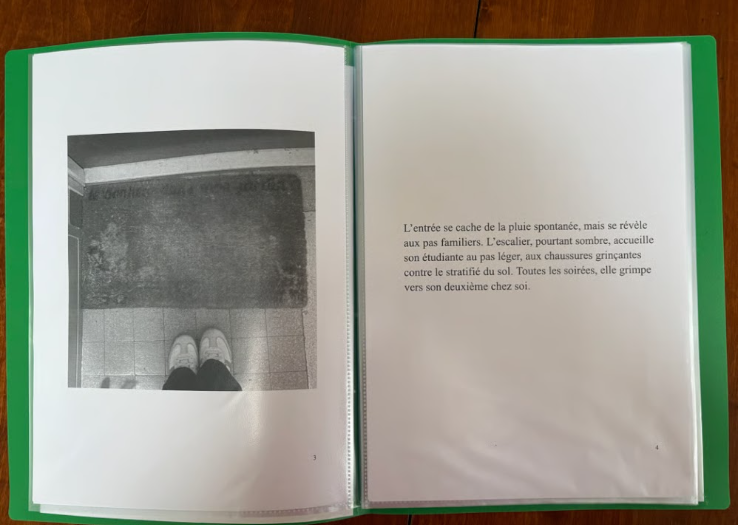
This was one of my texts for my final project. It translates as: “The entrance hides from the spontaneous rain but reveals itself to familiar footsteps. The stairway, nevertheless, somber, welcomes its student with a spring in her step, with her shoes squeaking against the laminate floor. Every evening, she climbs up to her second home.”
The Built-in Support of a Small Cohort
I felt lucky to be a part of the French Honors Program because it provided me with a built-in support system of caring and passionate professors. Throughout the semester, they fostered individual connections with us and frequently checked in about how we were transitioning to living abroad. They also took us on excursions around town during class time to museums, cafes, and more. Every Monday afternoon, my Honors Seminar professor took the group to a different cafe, so that we could discuss class readings over coffee. My professors immensely aided my transition and helped me feel immersed since the early days of the program.
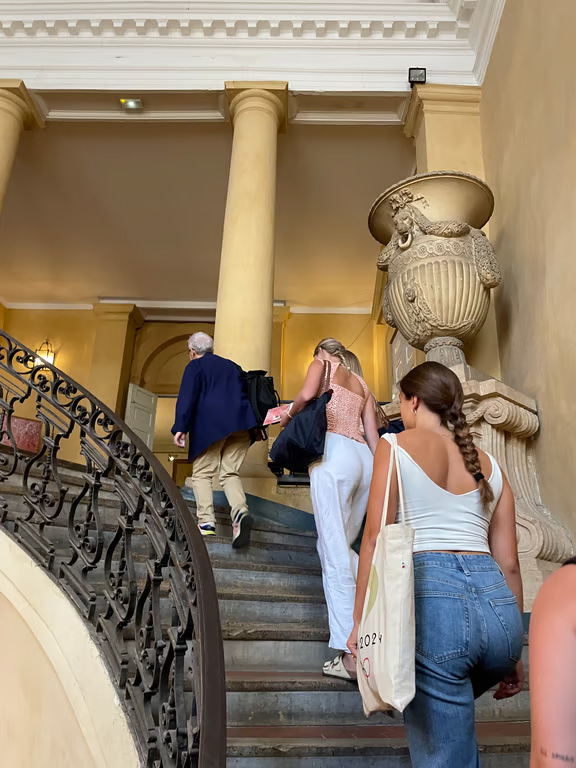
My classmates and I at a local museum in Aix.
My peers are what made the French Honors Program extra fun. We were a small cohort of seven girls, who came into the program with varying backgrounds in French, but with the same goal of immersing ourselves with the language during our time in Aix.
In a language-learning context, feeling comfortable is of utmost importance because you are going to be talking a lot, asking a lot of questions, and making mistakes. My classes were a safe space to make translation errors–many times our errors made us laugh. This program was definitely one of my most positive and encouraging educational experiences. And it was a bonus that these girls became my close friends during my time abroad.
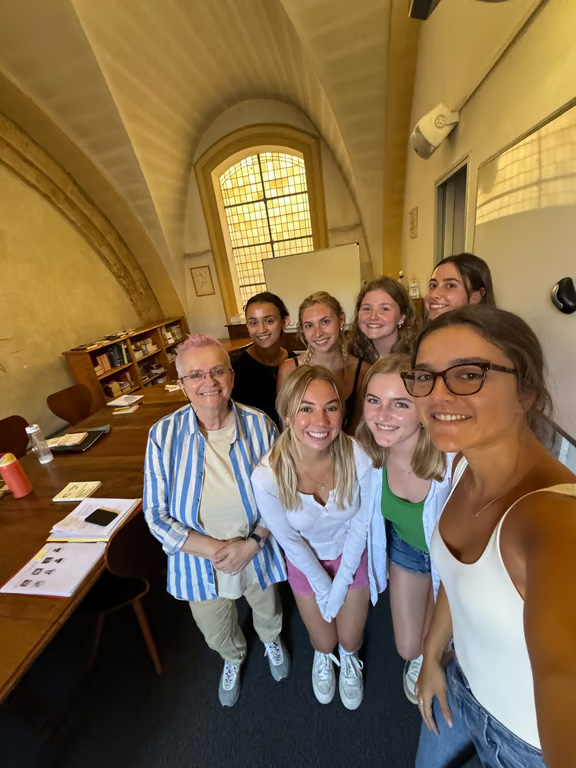
The seven of us and our professor in our seminar classroom.
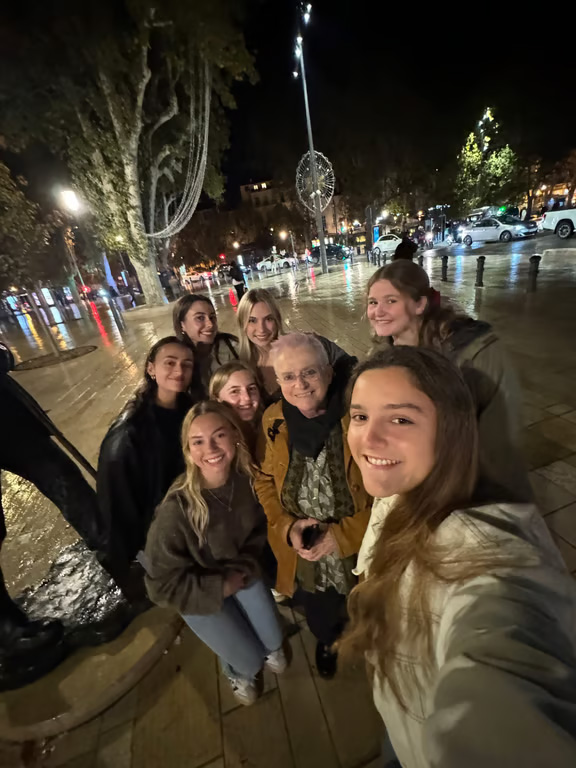
The seven of us and our professor before attending a French comedy performance.
The Challenges of Language Immersion and How to Overcome Them
It goes without saying that language immersion can be quite exhausting at times. You’re constantly thinking about the correct ways to say certain things, as you’re trying to pool from the vocabulary you already know as well as attempting to conjugate your verbs appropriately. Oftentimes, you find that you don’t have enough vocabulary to explain complex thoughts. This definitely gets tiring and can sometimes be a bit discouraging.
I completely understand this feeling. Even with a strong foundation in the language to begin with, launching myself into an environment in which I’d only speak French was quite challenging. Particularly in the beginning, I talked less than I normally would in social situations, due to sometimes not having enough vocabulary to express a more complex thought. I did a lot of active listening, and I really enjoyed it. I loved sitting at dinner with my host mom and sister, laughing at their witty comments to each other and their commentary on politics. I learned a lot from listening to them.
I learned a lot of slang from my host sister, which I had fun incorporating into my vocabulary. When their whole family got together for dinner, their conversations were fast-paced and consisted of inside jokes and commentary on family drama. Although it was a challenge to keep up, I loved being a part of their dynamic. My host mom always gave me context on what they were talking about and explained things to me on the side so that I could follow. This really helped.
Speaking in another language is almost always harder than understanding it. I slowly gained more confidence in speaking French, and I think this came from all the time I spent conversing with my host mom and from participating in class discussions. Overtime, I noticed that I was able to participate without engaging in so much mental effort. I could now speak with more ease. Along the way, it helped me to ask lots of questions. I was constantly asking about words I didn’t know. I kept a little dictionary for one of my classes of words and expressions that I learned along the way. I also tried to take more risks when speaking. I started sentences I didn’t know how to finish, and my host mom and professors were there to help me complete them. Improvement comes very gradually, and the result is rewarding.
Why You Should Consider Language Immersion
You may be thinking that an honors program like this will add a lot of additional schoolwork to your plate. In my experience, this was not the case, and it most definitely did not get in the way of my travel plans or social life abroad.
Instead, I found it to really amplify my experience, through enhancing my cultural knowledge of the region. It involved a lot of unique field trips and in-depth discussions and readings about politics, art, and more.
A program like this will likely provide you with a small, supportive cohort of students, which will be a comfortable setting in which you can practice the language all the time. This is also a great way to make friends and to connect with people who have similar interests.
Instead, I found it to really amplify my experience, through enhancing my cultural knowledge of the region. It involved a lot of unique field trips and in-depth discussions and readings about politics, art, and more.
A program like this will likely provide you with a small, supportive cohort of students, which will be a comfortable setting in which you can practice the language all the time. This is also a great way to make friends and to connect with people who have similar interests.
This post was written by Emma Oillarburu, a CEA CAPA Alumni Ambassador from Cal Poly, who studied abroad in Aix-en-Provence, France.











